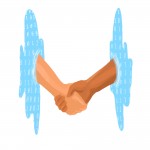We live in an age where everything we interact with is becoming “smart,” be that our phones, watches or even washing machines. The Internet of Things – where everything around us is tethered to the internet – is changing our lives and habits in dazzling and frightening ways. This blog series will explore the interesting questions of privacy, the future of computer science and the challenges that lie ahead for our digital society.
It’s hard to imagine, but there was once a time when people couldn’t watch cat videos on their phones. Harder yet to imagine is the time when the most anybody could do with his or her phone was play Brick Breaker and grumble when the trial version expired.
Actually, that was only about 10 years ago.
While it seems like it was just yesterday when Steve Jobs unveiled the first iPhone, for some of us, that feels like the new Stone Age. The times have changed and technology with it: We’ve gone from a time where BlackBerry phones were viewed as a sign of higher social class to a time where more than 64 percent of adults in the United States have smartphones.
And in today’s age of the Internet of Things, where a click of a button can share your heartbeat with hundreds of people across the world, we’re left wondering what this all is supposed to mean.
In other words, what does this digitalization mean for society as a whole?
The last frontier
The Internet of Things has had lasting effects on people’s daily lives and privacy of data. It’s clear if you take a step back, however, that the Internet of Things has also had a profound effect on cities and societies, especially in terms of economies and city governance.
Economies around the globe have gone digital to a notable extent and with that, a new level of globalization has rushed in. While countries are bound by borders, the internet is not, and it is thus able to tap into a multitude of markets with tantalizing ease.
The Internet of Things has affected different countries’ economies and cultures in distinct ways, but we can see firsthand its effect on urban America just by looking at the conveniences we’re afforded by our smart devices. Everything, from being able to call a taxi to your doorstep to electronically sending money to your friend’s bank account, shows the boundlessness of the the Internet of Things.
If they haven’t already, companies are starting to realize the internet is here to stay and that they need to capitalize on it to stay relevant to the times. To put it bluntly, the internet has stolen Alaska’s title as “The Last Frontier.”
There is a catch, however. Goods and services are not virtual – businesses still need to provide tangible products.
For example, Uber makes a fortune off its mobile app, but it needs to mobilize taxis in order to make a profit. And while Google’s search engine does wonders for the internet, it can’t make a profit unless it sells the data it collects – which requires contracts and thus contract agreement laws.
We can therefore see city and state governance injecting themselves into Internet of Things. Be it regulating or even embracing companies’ services, cities play a crucial role in getting communities hooked onto the Internet of Things.
Los Angeles’ own 2024 Olympic bid group is evidence of this. The bid has been placing placing great emphasis on eSports and the Internet of Things, even giving prizes at UCLA’s annual LA Hacks hackathon to students who developed applications integrating technology with athletics.
Of course, it’s no secret that governments are slow to change, but as we can see, cities and states are realizing they can no longer turn a blind eye to the Internet of Things.
Because of this, municipal governments are slowly being forced reconcile civil infrastructure – bridges, roads, canals – with digital infrastructure. And it’s fascinating to watch this, considering the former is easily outdated and the latter is almost always in flux.
Welcome to the new age
“Welcome to the new age.”
For the past couple of years, the Internet of Things has had us singing to the tune of Imagine Dragon’s “Radioactive,” even though we’re not exactly a bunch of puppets in a cockfight. The Internet of Things has ushered in a new era of convenience and concerns, and we’re all getting front row seats into society’s ugly yet admirable transition into the new age.
It’s clear how the Internet of Things is born of our infatuation with convenience, and how as a result, our sense of privacy is being jeopardized. Moreover, we’ve seen how the Internet of Things is almost self-perpetuating, breeding innovation at blazing speeds – one minute we had the smartwatch, and now consumers are being hit with smart washers, smart refrigerators and self-driving cars.
The increased connectivity we experience as a result of the Internet of Things comes at the expense of data, and by virtue of our lives becoming more digitalized, we are slowly morphing into mere data points. Of course, we can see this need for data as companies’ attempts at understanding humanity in a binary fashion – literally – but the conversion is happening nonetheless.
If I’m to spill the beans, the Internet of Things means a multitude of things for society. While some of these were covered in this blog series, it would take another just to list all of them. And there are only more more million-dollar questions to come as society dives headfirst into the Internet of Things.
But for the unassuming Bruin walking down Bruin Walk, perhaps the one thing we need to take away from the Internet of Things is that we need to embrace it to remain relevant and enjoy its benefits. We just need to make sure we also have a couple grains of salt in our back pockets while we’re at it.
